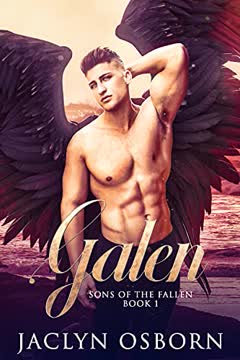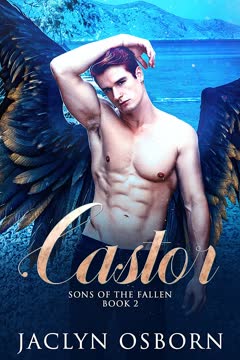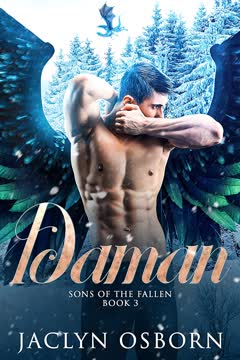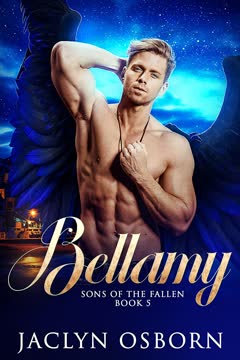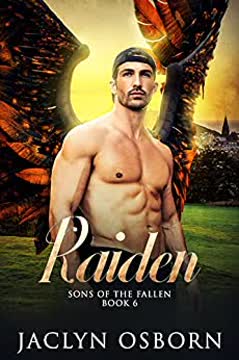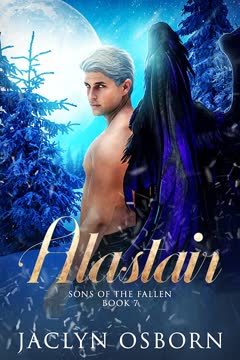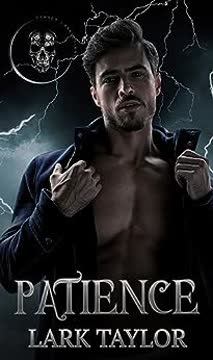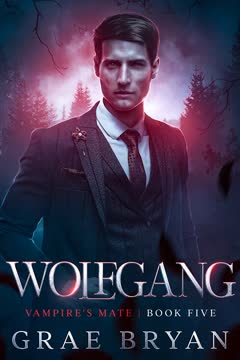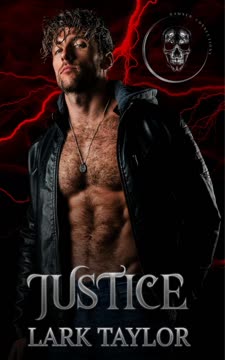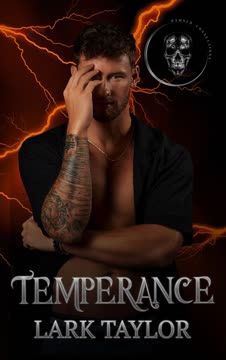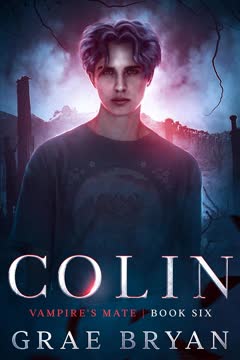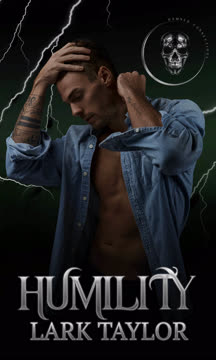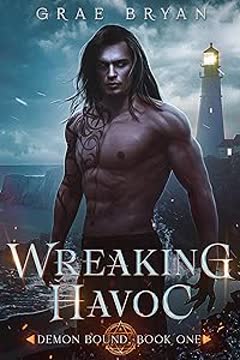Plot Summary
War's Unwanted Children
In a world where the children of fallen angels are cursed with the seven deadly sins, Gray grows up under the shadow of war and his father's harsh training. Torn from his family by the angel Lazarus, Gray is shaped into a living weapon, his innocence lost to violence and manipulation. Alongside his "brothers"—other Nephilim cursed with sin—he is forced to fight, love, and survive in a world that sees him as both a threat and a tool. The trauma of his upbringing and the burden of his curse haunt him, but the bonds with his brothers become his only light in the darkness.
Sloth's Sleepy Heart
Now an adult, Gray lives with his brothers in Echo Bay, a haven for supernatural beings. His sin, Sloth, makes him perpetually tired, often sidelined from battles and treated as fragile. Despite his lethargy, Gray's heart is open and affectionate, craving connection and purpose. He finds comfort in small joys—anime, cuddles, and playful banter—but beneath his cheerful exterior lies a deep yearning to be seen as more than just the sleepy one. His vulnerability and kindness set him apart, even as he struggles with feelings of inadequacy.
Hunter Meets Fallen Son
Mason Hawk, a former Marine haunted by a supernatural attack in Afghanistan, has become a monster hunter. His life is a cycle of violence, guilt, and restless nights. When a hunt brings him to Echo Bay, he encounters Gray and his brothers during a deadly confrontation with a manananggal. The meeting is electric—Gray's innocence and warmth clash with Mason's hardened exterior. Both are drawn to each other, but their worlds and wounds threaten to keep them apart. Mason's skepticism and Gray's trust set the stage for a transformative connection.
Monsters in the Shadows
As monster attacks increase, orchestrated by Gray's father Belphegor and the demon Asa, the brothers and their allies are forced into action. The world teeters on the brink of chaos as demons, ghouls, and reapers sow terror. Gray and Mason, now reluctantly allied, must navigate the dangers of both the supernatural war and their growing feelings. The brothers' home becomes a sanctuary and a battleground, as trust is tested and old wounds resurface. The looming threat of apocalypse forces everyone to confront their deepest fears and loyalties.
Brotherhood and Burdens
The Nephilim brothers, each embodying a deadly sin, struggle with their roles as protectors and the weight of their inherited darkness. Their relationships—with each other, their mates, and the world—are fraught with love, rivalry, and pain. Gray's desire to prove himself clashes with his limitations, while Mason's outsider status challenges the group's unity. The brothers' history, marked by loss and betrayal, shapes their every decision. As war draws closer, the bonds of brotherhood are both a source of strength and a reminder of all they stand to lose.
The Human and the Angel
Despite their differences, Gray and Mason are irresistibly drawn together. Their relationship is a dance of vulnerability and desire—Gray's openness softens Mason's defenses, while Mason's strength gives Gray courage. As they share their traumas and dreams, trust grows, but so do the risks. The fated mate connection between them intensifies, blurring the line between destiny and choice. Their love becomes a beacon in the darkness, but also a potential weakness as enemies close in and the cost of caring becomes painfully clear.
Secrets, Sins, and Scars
The brothers' secrets—about their origins, their curses, and their past failures—come to light. Gray confesses his role as an assassin, trained to kill by Lazarus, and his inability to kill his own father. Mason reveals the depth of his survivor's guilt and the loss of his first love. These confessions bring them closer, but also threaten to unravel them. The group must confront the reality that their greatest enemies are not just monsters, but the shadows within themselves. Forgiveness, both of self and others, becomes the hardest battle.
Trust and Betrayal
As the war escalates, trust is tested on all sides. Mason's loyalty is questioned after he is caught sharing information with other hunters, and Gray's faith in him is shaken. The brothers struggle to balance their need for allies with the fear of betrayal. Old enemies resurface, and even friends like the reaper Holden and the demon Phoenix reveal hidden agendas. The fragile peace in Echo Bay is shattered, and the cost of misplaced trust becomes devastatingly clear. Only by facing their own doubts can the brothers hope to survive.
The World Unravels
Belphegor and Asa unleash chaos across the globe—monsters rampage, storms rage, and the dead rise. The brothers and their allies fight desperately to protect humanity, but the scale of destruction is overwhelming. The celestial realm itself is threatened as Belphegor seeks to breach its gates using stolen souls. In the midst of the carnage, Gray and Mason cling to each other, their love a fragile anchor. The world's unraveling forces every character to confront what they are willing to sacrifice for those they love.
Love in the Apocalypse
As the world burns, Gray and Mason's relationship becomes a sanctuary. Their physical and emotional connection deepens, culminating in confessions of love and the decision to become true mates. The wedding, planned in the shadow of war, is both a celebration and a defiance of despair. Their union is not just romantic, but a merging of souls—a promise to face whatever comes together. In the apocalypse, love is both a risk and a rebellion, a refusal to let darkness win.
The Assassin's Choice
Tasked with killing Belphegor to end the war, Gray must face the man who shaped and scarred him. The confrontation is fraught with pain, regret, and unresolved love. Gray learns the truth about his origins—that he and his brothers were created as weapons for Lucifer's army. Despite his resolve, Gray cannot bring himself to kill his father, and is taken captive. The failure is crushing, but it also marks a turning point—Gray must accept both his light and his darkness to move forward.
The Battle for Heaven
With the barrier to heaven breached, the brothers and their allies join the angels in a desperate battle against Asa, Belphegor, and the fallen. The fate of all realms hangs in the balance as Light Bringer, Lucifer's legendary sword, becomes the ultimate prize. Gray, empowered by love and sacrifice, plays a pivotal role in stopping Asa and reclaiming the sword. The battle is brutal and costly, but the bonds of family and love prove stronger than any curse or prophecy.
Light Bringer's Legacy
With Asa defeated and Light Bringer secured, the world begins to heal. The angels erase memories of the apocalypse from humanity, restoring a fragile peace. The brothers, forever changed by war and loss, must find new purpose in a world that will never be the same. Gray and Mason, now truly bound, look to the future with hope and determination. The legacy of Light Bringer is not just a weapon, but a symbol of the power of choice, forgiveness, and love.
Homecoming and Healing
The brothers and their mates return home, scarred but alive. Reunions are bittersweet—joy at survival mingles with grief for what was lost. The bonds of family are tested and strengthened as each character seeks healing in their own way. Gray and Mason's love becomes a source of comfort for others, a reminder that even in the darkest times, connection is possible. The home they create together is a sanctuary, a place where the past can be faced and the future imagined.
Mates Bound by Fate
The fated mate bond between Gray and Mason is finally sealed in a ceremony witnessed by family and friends. Their union is both magical and deeply human—a merging of strengths, weaknesses, and dreams. The ritual is not just about love, but about choosing each other in the face of uncertainty. Their bond becomes a beacon for others, proof that destiny can be shaped by courage and compassion. Together, they are stronger than the sum of their parts.
The Wedding and the War
The wedding is a moment of joy and defiance, a declaration that life and love persist even after apocalypse. The brothers, dragons, and allies gather to witness Gray and Mason's vows, their happiness a hard-won victory. Yet, the shadow of future battles remains—Belphegor and Asa are not truly gone, and the world is forever changed. The wedding is both an ending and a beginning, a promise to face whatever comes together.
Forever, For Now
In the aftermath, Gray and Mason find peace in each other's arms. Their journey—from brokenness and fear to trust and belonging—is a testament to resilience. The world is not perfect, and new threats may arise, but for now, they have each other. Their love, forged in war and tested by fate, becomes a lighthouse in the darkness—a promise that, whatever comes, they will face it together.
Characters
Gray
Gray, the avatar of Sloth, is the most emotionally open and vulnerable of the Nephilim brothers. Cursed with perpetual exhaustion, he is often underestimated and protected by his family. Yet beneath his gentle, playful exterior lies a history of trauma—trained as an assassin by Lazarus, forced to kill, and haunted by his inability to destroy his own father. Gray's journey is one of self-acceptance: learning to see his sensitivity as strength, his curse as a part of himself, and his capacity for love as his greatest weapon. His relationship with Mason is transformative, allowing him to heal old wounds and embrace both his light and darkness.
Mason Hawk
Mason is a former Marine turned monster hunter, driven by guilt over the deaths of his team in Afghanistan. His trauma manifests as emotional numbness, insomnia, and a relentless need to protect others. Meeting Gray challenges his worldview—forcing him to confront his prejudices, open his heart, and accept love. Mason's arc is one of vulnerability: learning to trust, to forgive himself, and to let go of the past. His bond with Gray is both healing and terrifying, as it requires him to risk everything for a chance at happiness.
Alastair (Pride)
As the eldest brother and avatar of Pride, Alastair is the group's strategist and moral compass. He is fiercely protective, often cold, and struggles to balance his responsibilities with his own desires. His history of loss—especially the death of his human lover—shapes his reluctance to bond deeply. Alastair's arc is about learning to trust others, to delegate, and to accept that vulnerability is not weakness. His leadership is both a shield and a prison, and his growth comes from allowing himself to feel and to hope.
Galen (Wrath)
Galen embodies Wrath, his temper and strength both a blessing and a curse. He is the family's enforcer, quick to anger and slow to forgive. His relationship with Simon, his human mate, is a source of grounding and tenderness, revealing a softer side beneath the rage. Galen's journey is about mastering his anger, learning to channel it for good, and accepting that love can be both fierce and gentle. His protectiveness extends to all his brothers, and his willingness to face his own demons is key to the group's survival.
Bellamy (Lust)
Bellamy, the avatar of Lust, is outwardly confident, flirtatious, and magnetic. His power to incite desire masks a deep sense of isolation and longing for genuine connection. His arc is one of self-discovery—moving beyond superficial pleasure to seek real intimacy. The revelation of his possible bond with the demon Phoenix hints at a future where love and hate, pleasure and pain, are inextricably linked. Bellamy's journey is about embracing vulnerability and finding meaning beyond the physical.
Raiden (Gluttony)
Raiden's sin is Gluttony, manifesting as both a voracious appetite and a need for excess in all things. Despite his size and strength, he is the most nurturing of the brothers, often cooking and caring for others. Raiden's arc is about balance—learning to channel his abundance into generosity rather than self-indulgence. His humor and warmth are a balm in dark times, and his loyalty is unwavering.
Castor (Greed)
Castor, the avatar of Greed, is driven by a need to possess and protect. His history of torture and betrayal has left him guarded, but his love for his mate Kyo and his brothers is fierce. Castor's arc is about letting go—of pain, of control, and of the belief that he must hoard love to keep it. His journey is one of healing, learning that true wealth lies in connection, not possession.
Daman (Envy)
Daman, cursed with Envy, is often distant and bitter, struggling to feel worthy of love. His relationship with Warrin, the ice dragon, is a source of solace and growth. Daman's arc is about acceptance—of himself, his place in the family, and the possibility of happiness. His power to incite envy in others is a double-edged sword, and his struggle is to use it for protection rather than destruction.
Belphegor (Gray's Father)
Belphegor is both a loving father and a ruthless general, torn between his affection for Gray and his loyalty to Lucifer's vision. His actions are shaped by grief, pride, and a belief that only violence can bring peace. Belphegor's arc is a cautionary tale about the cost of vengeance and the tragedy of love twisted by power. His inability to let go of the past dooms him, but his love for Gray remains a haunting echo of what might have been.
Lazarus
Lazarus is the angel who shapes the brothers into weapons, believing that only strength and obedience can save the world. His methods are brutal, his emotions repressed, and his loyalty to the celestial order absolute. Lazarus's arc is about the limits of control—how even the best intentions can create monsters, and how redemption is possible only through humility and change.
Plot Devices
Cursed Sins as Identity and Power
The central device is the literal embodiment of the seven deadly sins in the Nephilim brothers, each curse shaping their personalities, powers, and struggles. This device allows for deep psychological exploration—how trauma, expectation, and inherited guilt influence identity. The curses are both strengths and weaknesses, forcing each character to confront the duality within themselves. The narrative structure uses alternating perspectives and internal monologue to reveal how each sin manifests, both as a plot driver and a metaphor for human frailty.
Fated Mates and Soul Bonds
The fated mate trope is reimagined as a soul-deep connection that transcends physical attraction, binding characters together in ways that are both magical and profoundly human. The bond between Gray and Mason is not just romantic, but existential—a merging of wounds, hopes, and futures. The device is used to explore themes of trust, vulnerability, and the risk of loving in a broken world. The wedding and bonding ceremony serve as both a narrative climax and a symbol of hope amid chaos.
War as Catalyst for Growth
The supernatural war—between angels, demons, and their children—serves as both backdrop and crucible. The escalating violence forces characters to confront their pasts, make impossible choices, and redefine what it means to be a hero. The apocalypse is not just a threat to the world, but a metaphor for personal and collective trauma. The battle for heaven, the quest for Light Bringer, and the struggle to protect humanity all serve to test and transform the characters.
Foreshadowing and Revelation
The narrative is rich with foreshadowing—hints of betrayal, hidden motives, and the true nature of the brothers' creation. Revelations about their origins, the purpose of their curses, and the manipulations of both angels and demons drive the plot forward. The use of telepathy, shared dreams, and magical bonds allows for both dramatic irony and emotional intimacy, keeping the reader engaged and invested in the unfolding mysteries.
Healing Through Connection
At its core, the story is about healing—how connection, honesty, and acceptance can mend even the deepest wounds. The brothers' relationships with each other, their mates, and their allies are the true source of strength. The plot device of the found family, tested by war and loss, is used to explore themes of forgiveness, resilience, and the possibility of happiness after suffering.
Analysis
Gray by Jaclyn Osborn is a queer paranormal romance that reimagines the seven deadly sins as living, breathing burdens carried by the sons of fallen angels. At its heart, the novel is a meditation on trauma, chosen family, and the redemptive power of love. Through the lens of supernatural war and apocalyptic stakes, Osborn explores how inherited pain and societal expectations shape identity, and how healing is possible only through vulnerability and connection. The relationship between Gray and Mason is both a love story and a journey of self-acceptance—each man learning to trust, forgive, and risk happiness in a world that seems determined to break them. The book's use of fated mates, soul bonds, and magical curses is not just genre convention, but a metaphor for the ways we are all shaped by forces beyond our control—and the ways we can choose, again and again, to fight for hope. Ultimately, Gray is a story about the courage to love in the face of darkness, the necessity of found family, and the belief that even the most broken souls can find their way home.
Last updated:
Review Summary
Gray received mixed reviews, with some praising the sweet romance and character development, while others found it less exciting than previous books in the series. Many readers loved Gray's adorable personality but felt his sleepiness sometimes hindered the plot. The relationship between Gray and Mason was generally well-received, though some found Mason less compelling. Readers appreciated the ongoing series plot and character interactions, but some were uncomfortable with Gray's childlike portrayal. Overall, fans of the series still enjoyed the book despite its flaws.
Sons of the Fallen Series
Similar Books
Download PDF
Download EPUB
.epub digital book format is ideal for reading ebooks on phones, tablets, and e-readers.

